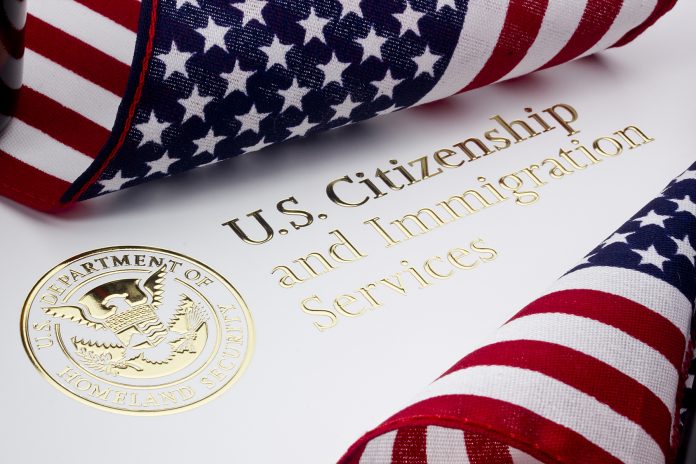The Trump administration has made the issue of tackling immigration as one of its primary focus areas.
While it has pursued its agenda related to illegal immigration loudly – with travel bans, increased arrest of undocumented immigrants and proposals for a border wall, it has quietly started restricting the flow of legal immigration as well without much fuss.
State Department and Immigration offices are scrutinizing visas far more closely and denying visas more frequently to people who are planning to visit the US for business or on being recruited by American companies, lawyers representing these visa seekers said.
Anastasia Tonello, the president-elect of the American Immigration Lawyers Association noted that it was the “real wall” that was being built.
Focus Is On Visa Granted To Temporary Workers
The Trump administration has managed to implement its immigration related plans with minimum attention by reducing the number of people who enter the country every year as temporary workers or permanent residents.
The administration has rolled out its initiatives on the basis of President Trump’s two executive orders that seek to protect the nation from terrorism and its workers from foreign competition.
The “Buy American, Hire American” order in particular addresses the H-1B visa program for skilled workers . “H-1Bs” are typically seen as cheap foreign labor being hired to replace American workers, as highlighted by the highly publicized recent Disney case involving the firing of its IT workers.
Applications Attracting Requests Additional Information
Around 85,000 H-1B visas, valid for three to six years , are available each year. A lottery is held since demand outstrips supply. However now even those lucky enough to win the lottery are being scrutinized more. Demands are made for extra information on the applicant’s work or education history or from the employer on the position being filled which can delay a decision by many months.
Such requests for additional information has jumped by 44 percent between January-August this year over same period last year according to data from United States Citizenship and Immigration Services.
While the most H-1B applications are getting approved, the approval rate is dropping. In October and November this year, 86 percent and 82 percent of H-1B applications were respectively approved as against 93 percent and 92 percent for the same months last year.
Roxanne Levine, an immigration lawyer pointed out that such extra information requests, are a “huge discouragement” for companies, “because of the massive extra time, effort and money required to respond.”
- Francis Cissna, the immigration agency’s new director, defended the additional requests being made as “perfectly rational and perfectly appropriate.”
Immigration Agencies’ Decisions Arbitrary
Some immigration lawyers and companies who had sought the visas believe that some of the decisions made by the agencies appear to be arbitrary.
In one such instance a consulting firm that applied for an H-1B visa for a British energy expert received a rejection even after furnishing additional details, on the grounds that the skills for the position “do not appear to be of such complexity, uniqueness or specialization as to require the attainment of a bachelor’s degree,” a mandatory requirement.
According to Russell Harrison, director of government relations for IEEE-USA, a society of technology professionals, while it was good that the administration was tackling visa abuse, adopting a blanket approach could hurt American competitiveness.
Approvals Not Being Received For Variety of Visas Types
Other types of visas are also getting lower approvals:
- Vladimir Eremeev of Russia applied for a L-1A visa to set up a branch of his cloud-based technology company, Ivideon in United Sates.
His request was denied by the government stating that the “organizational structure” planned in the country did not support the need for the kind of “managerial or executive position” that Eremeev was planning to fill. His lawyer, Oksana Bandrivska, noted that “it’s getting harder to win cases.”
- There is also more scrutiny of H-2B visas, which are seasonal work permits .
Jeff Joseph, a Colorado lawyer said the government was often denying visas for companies that were applying for such visas . The government argues that such companies are importing temp labor to fill permanent jobs, but according to Joseph his clients face labor shortage year on year.
- Changes are also being effected for foreigners who are already working or living in the United States on H-1Bs or other such temporary permits.
Reversing a 20-year policy, those being sponsored by their employers for a green card, or legal permanent residency, have to now pass in-person interviews, which Is likely to create a backlog in processing of green card applications.
- The administration has announced that it plans to eliminate a program that allows international entrepreneurs to stay in the US for up to five years.
- It also plans on eliminating a two-year-old program that allows spouses of H-1B to work.
- In another initiative foreign students will be restricted from finding temporary work in the US after they graduate.
- Another initiative affects green card holders who enlist in the military, one of the fastest way to gain citizenship. A recent change in procedures introduced in the Pentagon slows the process for these people significantly by adding several layers of vetting.



